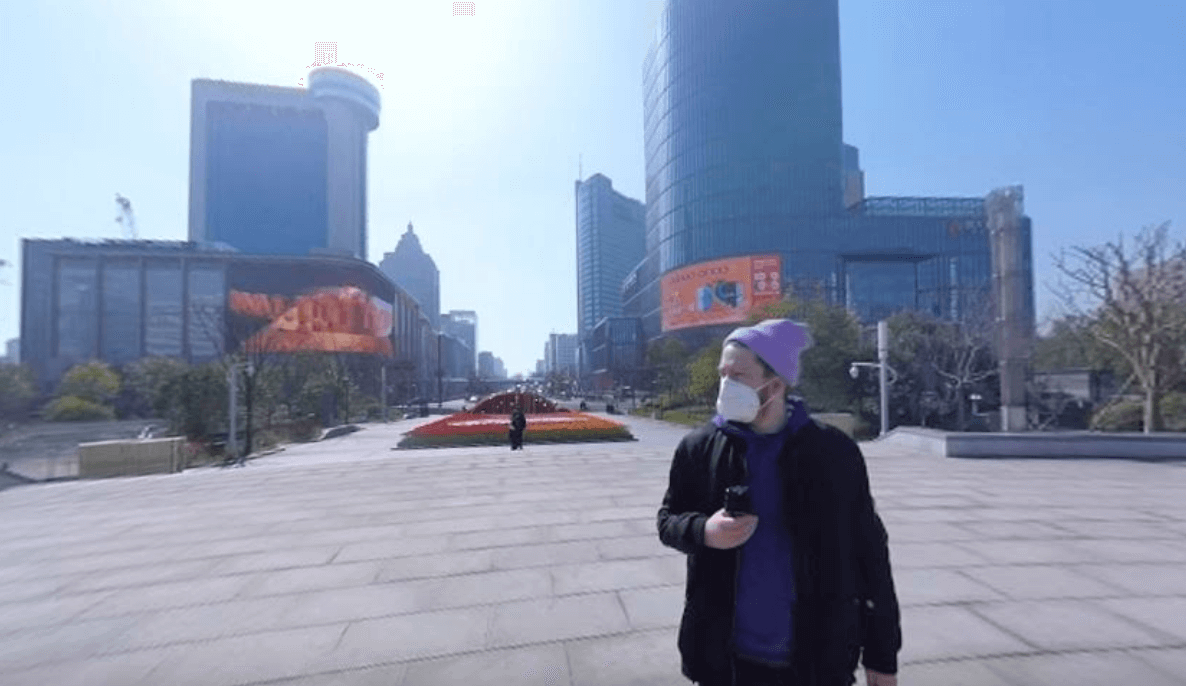In March, with all of China locked down to contain the spread of the deadly coronavirus, Canadian Nikk Mitchell shared a video on YouTube which showed what life was like in the country where the outbreak began.
Mitchell, a software developer in the eastern city of Hangzhou, ventured out of his apartment to shoot a 360-degree video of a bustling metropolis that had turned into a ghost town.
The video showed guards at checkpoints and Mitchell walking through his empty office.
Mitchell is the founder and CEO of FXG, a virtual reality (VR) company that produces content for companies such as GE, Sony and Huawei. He moved to China in 2006 to teach English, and established his own company seven years later.
Business was flourishing until the COVID-19 outbreak forced his company into lockdown, he said.
“It was really serious. The income in February and March was zero,” said a frustrated Mitchell. “Although business is recovering, (revenue) won’t be resumed until May or June.”
Chinese economy comes back to life
FXG is just one of many examples of international companies in China paralyzed by the virus. Information from a March 26 webinar put on by the Hong Kong-Canada Business Association revealed the huge impact COVID-19 had on China’s economy in the first quarter of 2020.
The cinema industry, for example, saw a 34.5 per cent drop in revenue in January; while restaurant earnings plunged 43 per cent. When the final numbers are crunched, Daniel Lee, a lawyer who specializes in foreign investment with the Shanghai-based firm, Jingtian & Gongcheng, estimates that China’s economic activity will have dropped by as much as 65 per cent.

Mikael Charette, director of business development at Trustrics Shanghai, a firm that advises international companies on doing business in China, said he believes the impact of the pandemic will be short-term and manageable.
“China’s local economy will get back up to speed very quickly in April,” he predicts.
He noted that Apple had reopened all of its 42 stores and Starbucks baristas were back at work by mid-March across China. On April 8, Wuhan, finally ended its 76-day lockdown, several days after other major Chinese cities like Beijing and Shanghai were springing back to life.
Future growth
As for future opportunities for international business post-outbreak, Lee sees potential growth in logistics, food safety and technology sectors that reduce reliance on physical interaction.
The Chinese government has also announced new policies to boost small and medium-sized enterprises such tax reductions, rent exemptions and government subsidies. In that regard, Mitchell is well-positioned to take advantage of those new opportunities.

In Hangzhou, life has almost returned to normal, aside from the fact that many residents still wear face masks. The streets are tied up in traffic and Mitchell is meeting with clients again to pitch new products. He recently made a promotional video to demonstrate how virtual reality helps people work from home. In the video, Mitchell presented on his VR headset from home while an audience watched in real time from a remote conference room.
“VR technology will be a definite trend although there is still a long way to go,” said Mitchell.
However, Canadian companies in China should still be cautious.
Pierre Wang, a tax consultant with Integra Group, recommends foreign companies conduct a “financial health check” by cutting unnecessary costs and consider lowering wages for under-utilized staff as well as contracting out to freelancers to save money.
The threat of a ‘second wave’
Even as the Chinese economy roars back to life, the country is cautious in order to prevent a second wave of COVID-19 infections. In early April, China saw a new spike in COVID-19 from contagious travellers returning to China from abroad.
In response, China has halted almost all international flights and banned the entry of foreigners while permitting overseas Chinese to return home.
With these travel restrictions, Charette said Canadian companies should expect to conduct more business with their Chinese counterparts through video conferencing apps such as Zoom and WeChat.
For Canadian entrepreneurs in China, analysts recommend putting in place extra precautions for employees returning to work in order to guard against the potential resurgence of the coronavirus.
At FXG, everyone now has to wear a mask in the office. Although there is already a government check point outside the building, the company will do a second temperature check of employees before they walk into the office.
Mitchell says he’s still adjusting to the new health measures.
“One of my biggest problems is my beard with this mask – which is annoying. But we survived.”
It’s an inconvenience the Canadian is willing to accept in order for his company to succeed in the post-coronavirus era.
This story has been produced under NCM’s mentoring program. Mentor: Judy Trinh.
Jessie Zheng is a freelance writer and documentary director based on Prince Edward Island. She is a member of the NCM Collective.




